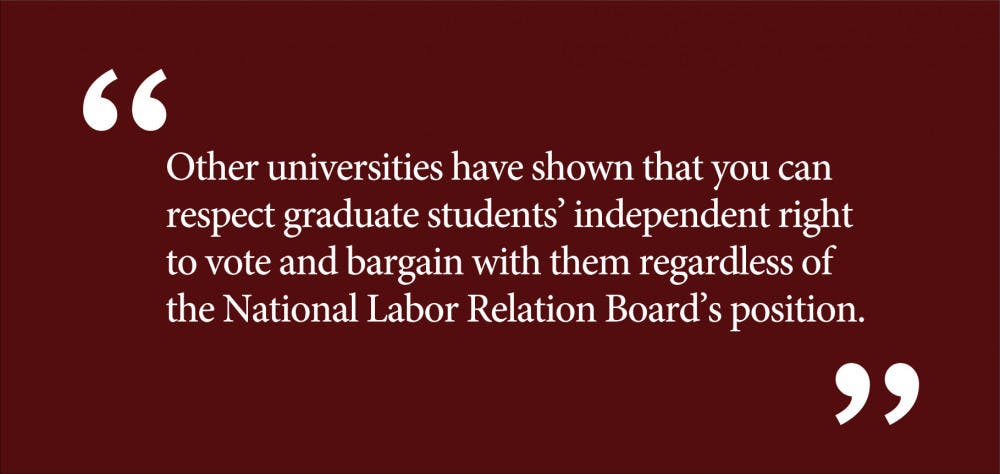Updated Oct. 24, 2018 at 4:48 p.m.
To the Editor:
Over the past few years, graduate students at the University, like graduate students at many other universities, have been organizing to form a union. Sometime in the near future graduate students as a whole will vote on whether to form this union or not. This vote comes after negotiations with the University administration about how to conduct the organizing drive and how to undertake the actual vote itself. This is an issue of interest and importance for everyone in the Brown community. The following paragraphs were drafted by us as an open letter and circulated in September to faculty who wished to state some principles and to express their concern about the administration’s approach to this process.
Alex Gourevitch
Associate Professor of Political Science
William Keach
Professor of English
Dear President Christina Paxson P’19, Provost Richard Locke P’18 and members of the Brown Corporation:
We believe that graduate students are an integral part of the Brown community. They are committed students who perform essential work for the University. In this letter we affirm three things. First, that graduate students have an independent right to vote on whether to unionize. Second, if the vote is in favor of unionization, the administration should recognize the chosen bargaining unit and seek a contract without delay. Third, that the vote and discussions about it should take place without faculty discouragement of graduate student participation.
The background is the following. This past spring the administration and Stand Up for Graduate Student Employees arrived at a pre-election agreement for what the University has called “a possible union representation election among the eligible graduate students at Brown.” We are happy that they have arrived at an agreement to hold elections. But the administration still does not recognize and support graduate students’ independent right to vote on unionization. The administration currently says that graduate students only have that right because the National Labor Relations Board says graduate students have that right. Worse yet, in the “Graduate Student Unionization” part of the Provost’s Sept. 4 “New Academic Year: Information and Updates” letter to faculty, we read that the administration “will terminate (the election agreement) immediately if the NLRB reverses the Columbia decision.” In other words, if President Trump’s NLRB decides graduate students don’t have a right to vote on unionization, the administration will no longer recognize that graduate students have that right. That is wrong and unnecessary. As other universities, like New York University and Georgetown University, have already shown, you can simply respect graduate students’ independent right to vote and, if they vote yes, bargain with them in good faith, regardless of the NLRB’s position.
We are happy that the Provost’s letter to faculty contains important reminders to faculty that they must not interfere with or attempt to discourage graduate students from discussing and voting on the question of unionization. We agree with that message. But the administration is still hedging by hiding behind whatever Trump’s NLRB might decide. We respect graduate student voices and the value of democracy on campus. That is why we affirm their independent right to vote on unionization. There should be a fair, impartial election. If the vote is no, then respect that result. If the vote is yes, then bargain in good faith and respect the contract.
Peter Andreas
Professor of International Studies and Political Science
Leticia Alvarado
Assistant Professor of American Studies
Mark Blyth
Professor of International Economics
Lundy Braun
Professor of Medical Science and Professor of Africana Studies
Corey Brettschneider
Professor of Political Science
Stuart Burrows
Associate Professor of English
Holly Case
Associate Professor of History
Jonathan Conant
Associate Professor of History and Associate Professor of Classics
Jim Egan
Professor of English
David Estlund
Professor of Humanities and Philosophy
Alex Gourevitch
Associate Professor of Political Science
Yannis Hamilakis
Professor of Archaeology and Professor of Modern Greek Studies
Daniel Hirschman
Assistant Professor of Sociology
Bonnie Honig
Professor of Modern Culture and Media and Political Science
Juliet Hooker
Professor of Political Science
Lynne Joyrich
Professor of Modern Culture and Media
Tamar Katz
Associate Professor of English
William Keach
Professor of English
Michael Kennedy
Professor of Sociology
Daniel Kim
Associate Professor of American Studies and English
Rebecca Nedostup
Associate Professor of History
Ed Osborn
Associate Professor of Music and Visual Art
Josh Pacewicz
Assistant Professor of Sociology and Urban Studies
Lukas Rieppel
Assistant Professor of History
Philip Rosen
Professor of Modern Culture and Media and Professor of English
Rebecca Schneider
Professor of Theatre Arts and Performance Studies
Naoko Shibusawa
Associate Professor of History and Associate Professor of American Studies
Susan Smulyan
Professor of American Studies
Mark Suchman
Professor of Sociology
Margaret Weir
Professor of International and Public Affairs and Political Science
Samuel Zipp
Associate Professor of American Studies and Urban Studies
Additional faculty signatories will be added to this letter.




